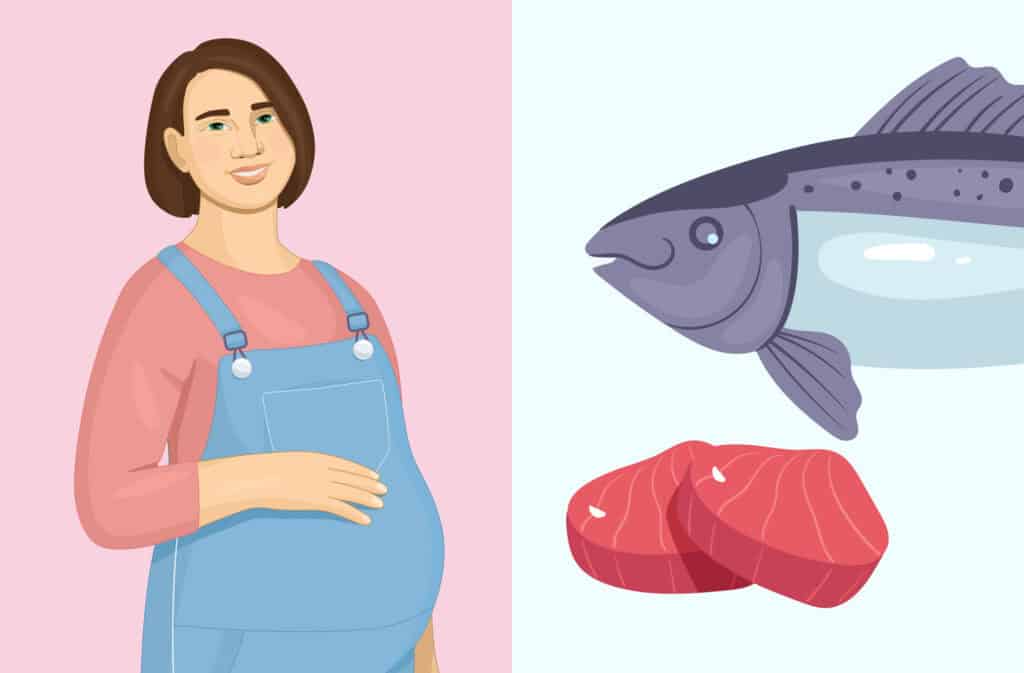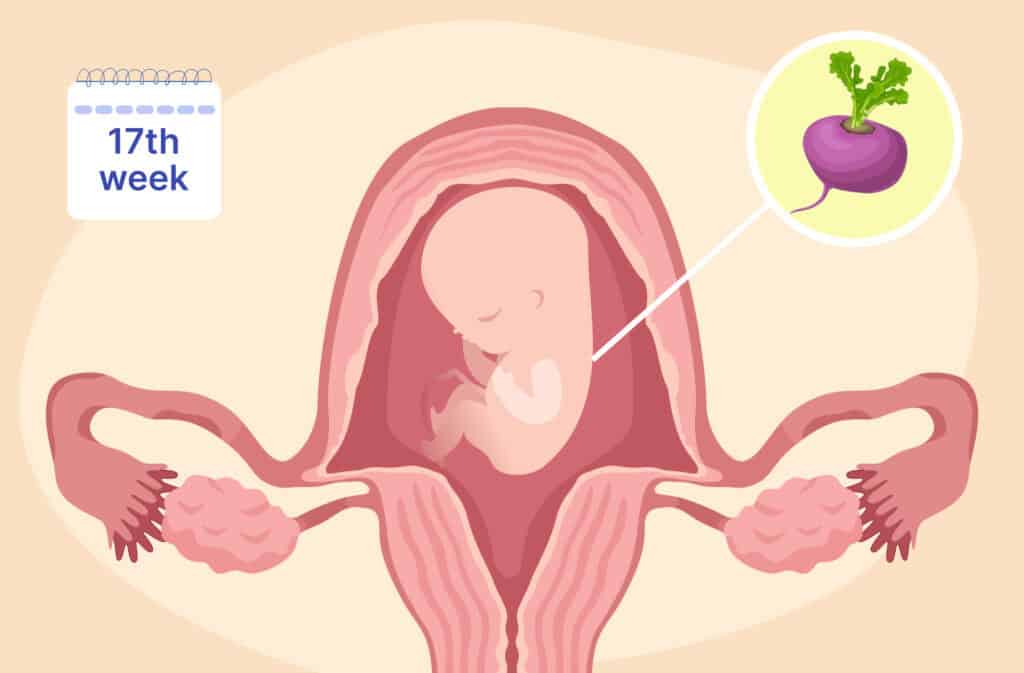Femia > Health Library > Pregnancy > Pregnancy health > Can you eat tuna while pregnant? What you need to know
Can you eat tuna while pregnant? What you need to know

- Updated Feb 10, 2025
- Published
CRAFTED BY HUMAN
Crafted by human At Femia, we provide accurate and up-to-date information at every stage of your journey, from trying to conceive, pregnancy and postnatal support. All content is created by a real person based on in-depth research and own professional experience. Femia ensures that you will receive expert advice, strict accuracy and a personalized approach from our authors/medical experts. Learn more about our editorial policy.
FACT CHECKED
Fact checked At Femia Health, we maintain the highest standards of editorial excellence in delivering content focused on helping you conceive, guiding you through pregnancy, and supporting you postpartum. Explore our content review principles to learn how we ensure the accuracy and quality of our health and lifestyle tips for every stage of your journey.
Yes, pregnant women can eat tuna in moderation. Certain types of tuna, like canned light tuna, are lower in mercury and safe to consume. Stick to 2-3 servings (8-12 ounces) per week and avoid high-mercury varieties like albacore and bigeye tuna.
Pregnancy often comes with a long list of dietary questions—especially when it comes to seafood. One of the most common concerns is can you eat tuna while pregnant? Tuna is a good source of protein and omega-3 fatty acids, but it can also contain mercury, which can be harmful to the developing baby. The key to safely eating tuna during pregnancy is knowing which types to choose and how much to eat. This article will explain what pregnant women need to know about tuna consumption, including whether you can eat canned tuna while pregnant and the best practices for minimizing mercury exposure.
Femia offers a personalized meal plan according to your pregnancy journey
Is tuna safe during pregnancy?
Tuna is generally safe to eat during pregnancy, but it’s important to be mindful of mercury levels. Mercury is a heavy metal that can accumulate in certain fish and, when consumed in excess, can harm the development of the baby’s nervous system. However, not all tuna is high in mercury.
The FDA and EPA recommend that pregnant women eat 8-12 ounces of low-mercury fish per week, which can include certain types of tuna. It’s important to stick to this guideline to enjoy the benefits of tuna without increasing the risk of mercury exposure.
Can you eat canned tuna while pregnant?
Yes, pregnant women can eat canned tuna, but it’s important to choose the right type. Canned light tuna is considered a low-mercury option and is safe to eat during pregnancy. This type of tuna includes varieties like skipjack, which has lower mercury levels compared to other types of tuna.
On the other hand, canned albacore (white) tuna contains higher levels of mercury and should be limited to no more than 4 ounces (about one serving) per week. When opting for canned tuna, choosing light tuna over albacore can help reduce your mercury intake.
👉Find out more: Top foods to fight nausea during pregnancy: A first trimester survival guide
Can pregnant women eat tuna sushi?
While cooked tuna is generally safe, pregnant women should avoid raw or undercooked tuna, including in sushi. Raw fish can carry harmful bacteria and parasites, such as Listeria and Toxoplasma gondii, which can lead to foodborne illnesses that are particularly dangerous during pregnancy.
If you’re craving sushi, opt for cooked versions, such as tuna rolls made with fully cooked tuna or other pregnancy-safe ingredients like vegetables or tempura.
How much tuna is safe during pregnancy?
When it comes to eating tuna during pregnancy, moderation is key. Pregnant women can safely consume:
- 8-12 ounces (2-3 servings) per week of low-mercury fish, which can include canned light tuna.
- Limit albacore tuna to no more than 4 ounces per week due to its higher mercury content.
By sticking to these recommendations, you can enjoy the nutritional benefits of tuna while minimizing mercury exposure.
What are the benefits of eating tuna during pregnancy?
Tuna, when consumed in safe amounts, provides several important nutrients that support a healthy pregnancy:
- Omega-3 fatty acids (DHA and EPA): These essential fats are crucial for the development of your baby’s brain and eyes. Tuna, especially fatty varieties, is a good source of these healthy fats.
- Protein: Tuna is a lean source of protein, which is important for the baby’s growth and the maintenance of maternal health.
- Vitamin D: Tuna contains vitamin D, which supports bone health and the immune system.
- Iron: Pregnant women need more iron to support increased blood volume, and tuna can contribute to your daily intake.
Eating tuna in moderation can help you meet your nutritional needs during pregnancy without the risk of excess mercury.
👉Find out more: Your pregnancy checklist: Week-by-week guide to preparing for baby
Types of tuna to avoid during pregnancy
While some types of tuna are safe in moderation, others are high in mercury and should be avoided or limited during pregnancy:
- Bigeye tuna: This type of tuna is high in mercury and should be completely avoided during pregnancy.
- Albacore tuna (white tuna): While albacore tuna is safe to eat in limited amounts (no more than 4 ounces per week), it contains more mercury than canned light tuna.
- Ahi tuna and yellowfin tuna: These types of tuna are also higher in mercury and should be eaten sparingly or avoided.
By choosing lower-mercury options like canned light tuna and limiting higher-mercury varieties, you can reduce the risk of mercury exposure.
How to safely enjoy tuna during pregnancy
Here are a few tips to help you safely enjoy tuna while pregnant:
- Choose canned light tuna: Opt for canned light tuna (like skipjack) over albacore or yellowfin tuna, which have higher mercury levels.
- Limit your servings: Stick to 2-3 servings (8-12 ounces) of low-mercury fish per week and limit albacore tuna to no more than one serving (4 ounces) per week.
- Avoid raw tuna: Always eat fully cooked tuna to avoid the risk of bacterial or parasitic infections.
- Check the source: When buying fresh tuna, ensure it comes from a reliable source to reduce the risk of contamination.
Femia offers a personalized meal plan according to your pregnancy journey
Questions from the Femia community
Can I eat tuna salad while pregnant?
Yes, you can eat tuna salad during pregnancy if it’s made with canned light tuna. Be mindful of the portion sizes and avoid adding too much mayonnaise, which can be high in fat and calories.
Can I eat tuna steaks while pregnant?
Tuna steaks, especially from larger species like yellowfin and albacore, tend to have higher mercury levels. It’s best to limit tuna steaks and opt for lower-mercury varieties like canned light tuna. If you do eat a tuna steak, make sure it is fully cooked and limit consumption to once a week.
Can I eat raw tuna while pregnant?
No, it’s not safe to eat raw tuna while pregnant. Raw tuna, such as in sushi, can carry bacteria and parasites that can cause foodborne illnesses. Always opt for fully cooked tuna during pregnancy.
The bottom line
Tuna can be a nutritious part of your pregnancy diet when eaten in moderation and with attention to mercury levels. Pregnant women can safely eat 2-3 servings (8-12 ounces) of low-mercury fish, including canned light tuna, each week. Avoid high-mercury types like bigeye and limit albacore tuna to one serving per week. By following these guidelines and sticking to fully cooked tuna, you can enjoy the benefits of this seafood without compromising your health or your baby’s development.
References
- U.S. Food and Drug Administration. “Advice About Eating Fish.” FDA, 17 Oct. 2023, https://www.fda.gov/food/consumers/advice-about-eating-fish#:~:text=The%20Dietary%20Guidelines%20for%20Americans%20recommends%3A,that%20are%20lower%20in%20mercury.
- “The Right Tuna for Pregnancy.” American Pregnancy Association, https://americanpregnancy.org/healthy-pregnancy/is-it-safe/the-right-tuna-for-pregnancy/.
- “Is Tuna Safe During Pregnancy?” Parents, https://www.parents.com/pregnancy/my-body/is-it-safe/is-tuna-safe-during-pregnancy/.
- U.S. Food and Drug Administration. “Listeria (Listeriosis).” FDA, https://www.fda.gov/food/foodborne-pathogens/listeria-listeriosis.

Discover the best fertility workouts to increase your chances of conceiving. Learn about yoga poses, exercise intensity levels, and tips for a fertility-friendly routine.

Learn about first-trimester screening tests, including how they’re performed, what they screen for, and what the results can indicate. Understand the process and what to expect during early pregnancy.

Discover what’s happening at 17 weeks pregnant, from baby’s position and size to symptoms, ultrasound details, and helpful self-care tips.

